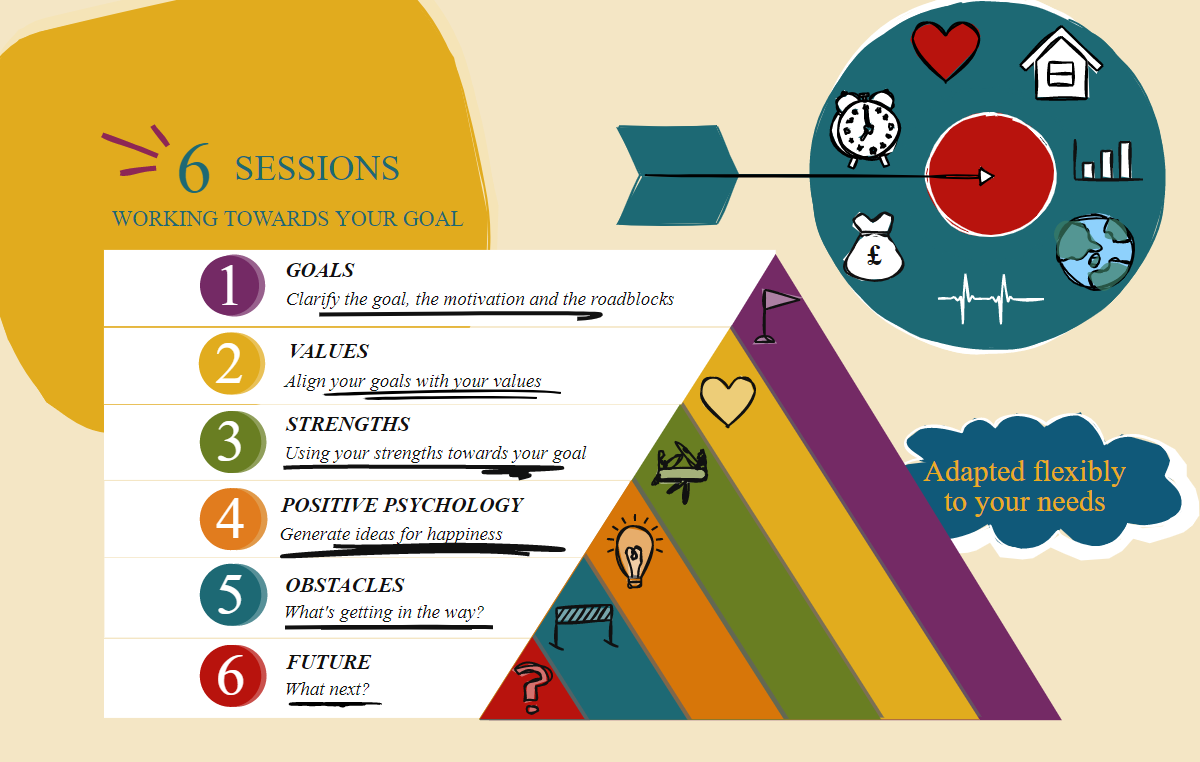Coaching
- How do you work as a life-coach?
- What is the difference between coaching and counselling?
- Do I need a goal?
- What is the difference between coaching and hiring a professional service?
- What is the difference between coaching and mentoring?
- Do you work to a coaching framework?
- What happens in a coaching session?
- How many sessions will I need?
- Do you offer coaching for divorce and separation?
- Do you offer coaching for Stress & Burnout prevention?
- Do you offer coaching for ADHD?
How do you work as a life-coach?

Coaching creates a safe space for clients to creatively explore their goals and ideas.
The coach asks powerful questions that enable the client to identify barriers and overcome them.
Coaching is present and future focussed.
It’s an effective way to help you reach a goal when you’ve struggled to figure out how. It can also help you identify and overcome psychological barriers in your way.
Life-coaching is an emerging field. There are lots of coaches out there, and “coach” is not a protected title; this means that anyone can call themselves a coach.
I call myself a coach because I have the appropriate qualifications. On top of my counselling training and management expertise, I personally studied a year-long, in-depth course, specifically in life coaching, giving me a CPCAB Diploma in coaching.
Many coaches work in a niche that reflects their subject of interest or specialism. Coaches can help people with career advancement, fitness goals, getting back to work, or even health goals such as quitting smoking. Coaching skills can also be very effective when embedded into any leadership or mentoring role, as they can be used to draw the best out of others.
Effective coaches are client-centred. You, the client, will always have more passion if any ideas are your own. The client identifies both the problem and the potential solutions. The coach’s job is to provide a safe space in which the client can generate and air those ideas. Great coaches add the most value when they ask powerful questions that facilitate the process and empower the client. Some coaches have personal knowledge of the goal and it may a bonus when they bring their own ideas to the table.
I haven’t painted myself into a corner with a specific niche, and I don’t feel the need to. However, I do have areas of speciality – click here for more information.
I work best with clients who are curious to develop their own self-awareness, interested in psychology and not afraid to explore their feelings as they relate to the goal. Emotions are powerful motivators and they are welcome in life-coaching sessions with me. I’m aware that there is often shame (or doubt) about not having achieved the goals already, (or worry that you’re not capable of achieving them), and so the safety of the space is vital. I’m never going to judge you for any ‘bad’ ideas or failing to achieve goals in the past. I’m a easy person to talk to about feelings of shame and other barriers to change.
What is the difference between coaching and counselling?

Counselling
Counselling is for people who feel there is something ‘wrong’. They are typically in some distress and just want to feel better.
In counselling, we meet frequently and go gently. We might explore your thoughts and feelings in more depth our feelings and perhaps explore the past events that contributed to current difficulties.
Metaphorically, if you turn up with a suitcase, we unpack it and re-pack it together.
Coaching
Coaching assumes that you are starting from a good place. You want to use sessions to achieve something more and propel your life forwards. You will have a change mindset and be very self-motivated.
We focus on the present and future. We rarely discuss the past and we’re certainly not rooting around in your history or feelings. Feelings are welcome because they are effective motivators, but in coaching, they are not the main event. Similarly, it can occasionally be helpful to reflect on past experiences, but we do not dwell there in coaching – there are plans to be made.
To use the suitcase metaphor again, if you turn up with your baggage, in coaching it’s my job to help you plan your trip.
Sessions are less frequent (usually monthly). At the end of each session, you leave with an action plan.
Cross-over
In both counselling and coaching, I apply my person-centred underpinning. Listening and understanding is the heart of my work with you. I believe in you and your ability to grow and change. We’re just starting from a different place.
Do I need a goal?

Yes. The goal keeps us focussed and on track.
That said, the goal can change and move.
Its also a perfectly valid goal to want to “figure out my goal”. If you know you want to change and grow, but you don’t know where to start, we can use a session to figure that out. I have tools to help, including the Wheel of Life.
I can help with goals such as:
- To separate / divorce
- To find a partner
- To better manage my ADHD
- To better support my SEN child
- To grow my small business
- To get a promotion
- To be more assertive
- To develop my boundaries
- To prevent burn-out at work and manage stress better
- To change career
- and more…
You may also want to draw on advice as well as coaching. I offer signposting to sources of information if I have them. I will also offer my own knowledge where appropriate, based on my lived and professional experience. However, my main objective is to empower you to draw on your own strengths and creativity, to apply critical analysis to any advice offered and to decide for yourself what you are going to do.
What is the difference between coaching and hiring a professional service?
You may be able to get closer to your goal by outsourcing or delegating some or all of the task to a third party.
Maybe you require a specialist skill that you don’t currently have, you don’t have time to do the task yourself, or perhaps you simply choose to spend your time on other things.
Examples include:
- Website design / creation / maintenance
- Marketing
- Legal services
- Medical professionals
- Advisory services
- Virtual Assistant
- Tradesperson (plumbing or electrics, etc)
In such cases you are paying a person or company for their time and skills in delivering a service. You might pay by time or upon completion of a task. Scoping the task well is very important in order to minimise the cost.
Coaching is for the part of the task that falls on you. Even if you choose to outsource, you still retain part of the task because you need to scope and manage the project.
Bear in mind also that some tasks can’t be delegated at all – like setting and enforcing personal boundaries.
Coaching helps you to access your creativity and ideas, and to upskill where needed.

What is the difference between coaching and mentoring?

Mentoring
Good mentors will hopefully have some coaching skills, but still, it’s different.
A mentor is usually a more experienced, more networked person in your field. They give you the benefit of their experience and may introduce to people who can help you move forwards.
Coaching doesn’t rely on the benevolence of a mentor. There isn’t the same power imbalance either. The coach doesn’t come with an assumption that they know more than you, in fact, they respect you as the expert in your own life. They give you the space to generate and air your own ideas.
What should I expect from a coaching session?

Sessions are typically 90 minutes and once monthly.
Frequency and duration
Sessions are typically 90 minutes and once monthly.
The reason for a longer session is that there is usually a lot to discuss, and the monthly frequency gives you time to take action based on the outcome of each session.
Six months is a nice period over which real change is achievable and can be both felt and measured. We could alternatively align the duration of coaching with that of your project.
I am happy to discuss different session lengths, course lengths and frequency.
Some goals may lend themselves to a shorter session length and increased frequency. Examples of more frequent sessions include:
- Your goal is to get a promotion and are quickly preparing for an imminent job interview, or
- Your goal is to find love and you want to discuss the dates you are going on.
Other goals may lend themselves to a long-term coaching relationship that goes beyond six sessions. For example, if you want a safe space to continually improve your growing business.
Check-ins
Subject to fair use, you can also check-in with between sessions, if you’re stuck on your action or just want to tell me about your achievements.
Location
Sessions can be online or in-person. For in-person, my office is in Winton, Bournemouth.
Contract
I will always send you a contract in advance of starting.
If you’d like a conversation to see if coaching is for you, please feel free to book a consultation chat.
Do you work to a coaching framework?

Yes, loosely.
Coaches use frameworks to help keep sessions focussed and on track. My person-centred underpinning means that I am happy to drift away from the framework if it seems to be what you need in the moment. But there are a few models and frameworks that I draw upon to give structure.
GROW
Goal
Reality
Options
Way Forward
I always make sure that we stay focussed on a goal, even if that goals shifts and changes, it is done consciously as opposed to ‘drift’.
At the end of each session, we always agree actions that take you towards that goal.
This model is incredibly useful but a bit too simple, which is why I incorporate CLEAR.
CLEAR
Contracting
Listening
Exploring
Action
Review
CLEAR helps me incorporate my person-centre underpinning and counselling skills. In listening and exploring, I’m getting under the surface of the issue and seeing nuance that can be missed with a more shallow approach.
Used with GROW, CLEAR is an incredibly useful model to apply in each session, but it doesn’t help structure a row of sessions. Which brings me to the 6 session framework…
SIX SESSION FRAMEWORK
I loosely apply this framework to ensure progress from one session to the next. It may be that we spend longer on one element and skip over another, or jump around between sessions, but I find it helpful to help me cover every element over the course of sessions.
Session 1 clarifies the goals and checks that we are focussing on the right thing.
Session 2 explores your values, and how they can be used to motivate yourself towards your chosen goal.
Session 3 explores your strengths. It is quite natural to focus on what we’re NOT good at and forget what we ARE good at. Sometimes we can flip this and use what we are good at to overcome what we are bad at. This is especially useful in ADHD coaching.
Session 4 draws on positive psychology to look for ways to improve happiness (if that fits with your goal).
Session 5 looks at the obstacles. We can re-visit values and strengths to overcome them and help you get out of your own way.
Session 6 looks to the future. Are you done with coaching? Is there another goal? Should you just enjoy all you’ve accomplished?
Do you offer coaching for divorce & separation?

Yes!
I have personal experience of navigating a complex divorce, and I used every skill in my toolbox to get through it. I needed emotional strength, patience, boundaries, intelligence and assertiveness. It also drank money. It was far more expensive than the wedding – though worth every penny.
According to 2021 ONS statistics, approximately 42% of UK marriages end in divorce. Older data from 2013 suggests that 48% of divorcing couple had at least one child under the age of 16.
This is a tough time both emotionally, practically and financially.
Theoretically, kicking off a divorce application is fairly straight-forward, especially with the ‘no fault’ divorce’ process that was introduced in 2022. The tricky part arises in agreeing how to split money and the care of children.
If you and your ex are on the same page, this can make divorce relatively painless. Unfortunately, this is not always the case, especially as relationships often end with a lot of strong feelings at play. It may therefore be necessary to use either mediation or the legal system to help work that out.
Where can I start researching divorce?
A good place to start is by gathering information, starting with the excellent information on the citizen’s advice webpages.
Many solicitors will offer a free hour to talk about your case. You can get a good steer in that free session.
If there is any abuse in your home, please contact Women’s aid, or in Dorset, Paragon. If your partner is abusive, the risk to your safety INCREASES when you try to leave. Please contact a charity to discuss your options and build a safety plan before taking that step.
How can coaching help?
As a coach, I add value by helping you navigate this difficult life-event. I can help you explore options and upskill in areas such as confidence, assertiveness and communication.
Life-coaching can help by help by offering you a safe space to muse the challenges and in which to make decisions.
Consider the following questions you might be asking yourself:
- Do I even want a divorce? Can I save this marriage?
- How do I tell him/her?
- Can I financially support myself (and kids) if I choose to separate?
- Am I stuck with him/her for financial reasons?
- Where would I live?
- Do I need to hire a lawyer?
- Can I process the divorce myself?
- How do I navigate conflict?
- How can I be assertive?
- How will we co-parent?
You will likely have to navigate some difficult decisions and conversations as you progress towards divorce. With my support, you can develop plans and strategies to move you towards your goal of ending this relationship whilst attempting to minimise the conflict and cost.
Do you offer coaching for Stress & Burnout prevention?

Yes!
Lets look at what stress and burnout are, then I can explain how coaching can help.
What is stress?
“A state of mental or emotional strain or tension resulting from adverse or demanding circumstances”.
Oxford languages
We are often quick to assume that being stressed is a personal failing, but if you read the above, you’ll see it is “resulting from […] circumstances”.
This means that if we change the circumstances, the stress will go away. Now, I know its not that easy, especially in modern life where those circumstances permeate every facet of our existence.
Stress management essentially boils down to two things:
- Can we reduce the volume of adverse or demanding circumstances? and/or
- Can we become more resilient to the circumstances we find ourselves facing?
If you find yourself feeling distressed by the above, then counselling or another mental health treatment is more appropriate for you. However, if you can read the above and feel pragmatic about it, then coaching might be for you.
What is burnout?
Burnout happens to a certain kind of person. Its the kind of person who is seen outwardly as reliable and diligent. They are usually a very strong, ethically driven person.
They experience stress and push right on through it. They don’t quit!
Because they power through, eventually their body forces them to take notice. They became exhausted and despondent. They can’t see a way out of the mess and they start making mistakes. They are hyper-fixated on work and feel that the weight of the world is on their shoulders.
Just as with stress, if you can read the above and feel pragmatic about it, then coaching might be able to help you. But if its too distressing, then please seek mental health support and check my counselling pages.
How can coaching help?
As a coach, I can help you understand your stress or burnout.
We look at the internal and external factors that brought you to this place, and work to reduce them.
External factors might include your job or your line manager. So we explore in coaching what you can and can’t do about that. A lot of the work is finding that line between the things you can and can’t control.
Internal factors usually include lack of boundaries and lack of life-work balance. Poor communication and emotional regulation skills may be at play too. A lot of people with burnout place too high a value on the jobs, finding meaning in work. We can explore in coaching if these factors (or others) are in play, and work towards overcoming them.
ADHD and burnout
People with ADHD are at higher risk of burnout, and as I also offer ADHD coaching, these can be combined.
Do you offer ADHD coaching?

Yes!
What is ADHD?
People with ADHD show a persistent pattern of inattention and/or hyperactivity–impulsivity that interferes with day-to-day functioning and/or development.
ADHD UK – follow for more
I prefer not to see ADHD as a disorder, but instead as a ‘difference’. I might use the term “neuro-spicy” – which includes other neuro-developmental conditions including Autism, Dyslexia, Dyscalculia and Dyspraxia.
How do I know if I have ADHD?
There are three core characteristics: impulsivity, inattention and hyperactivity. Hyperactivity can be in the mind, so you can live in a more sedentary body and still have a mind that is going at 100 mph.
Roughly one in twenty people are estimated to have ADHD and the vast majority are undiagnosed.
If you think you might have ADHD, there is a screening test via this link. The only way to know for sure is to get diagnosed by a qualified medical professional.
What helps people with ADHD?
Its a relatively new field but the current recommendations from experts include:
- Medication
- Psycho-education
- Cognitive Behavioural Therapy (CBT), and
- Coaching
As I am not a doctor, I cannot diagnose ADHD and nor can I offer medication for ADHD. For those you need an official diagnosis.
How can coaching/CBT help?
In coaching I can help you explore why you might want (or not want) to seek diagnosis.
I can help you explore if your lived experience seems to resonate with features of ADHD. If it does, then we could use ADHD coaching methods to support you, with or without a formal diagnosis.
Elements of CBT can be useful to neuro-spicy people, so I bring CBT tools where appropriate. My personal opinion is that CBT and ADHD coaching needs to be delivered by a therapist/coach with a deep understanding of ADHD. Without the proper awareness training, they can easily and inadvertently ‘trigger’ their client into feeling criticised or shamed. If you’ve had CBT in the past and hated it, this may be why. The way I deliver it reduces that risk.
ADHD and burnout
People with ADHD are at higher risk of burnout, and as I also offer burnout coaching, these can be combined.